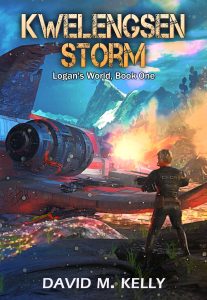David M. Kelly writes fast-paced sci-fi thrillers in the near future with compelling characters, cynical humor, and (most importantly!) sound science. He is the author of the Joe Ballen series (The Mathematics of Eternity, Perimeter, Transformation Protocols and Intersections), the Logan’s World series (Storm Kwelengsen, Dawn of Kwelengsen), and the sci-fi comedy series Hyperia Jones ( Hyperia Jones & Capers Olive Branch). David’s interest in science and technology began very early.when he was six years old, his parents allowed him to stay up late to watch the TV show Neil Armstrong walk on the surface of the moon. Since that day, he became addicted
to all things science and space. An avid reader, he browsed the contents of the mobile library that visited his street, perusing the YA (or “adolescent” titles as they were called at the time) for to the classics of Robert Heinlein, Isaac Asimov, Arthur C Clarke and Harry Harrison. David has worked in project management and software development for many years. Along the way, his interests include IPSC (target) combat pistol shooting, drag racing captain, and several years as a bass/vocalist in a heavy rock band. He also tries to incorporate practical work into manual jobs, from digging ditches, working on a production line to loading and unloading trucks in a trucking company. Originally from the wilds and crevices of Yorkshire, England, David immigrated to Canada in 2005 and settled in Northern Ontario with his patient and supportive wife, Hilary. Foot surgery in 2014 temporarily interrupted many of his favorite activities – hiking, camping, test driving his own Starfighter (also known as the Corvette ZR-1). But on the plus side, it meant a transition from the computer world to life as a full-time writer – an opportunity he enthusiastically embraced. David is passionate about science, especially astronomy and physics, and is an avid follower of scientific news. Never short of perspective, David writes about science and technology on his davidmkelly.net blog. He has supported various charitable projects such as the Smithsonian’s reboot suit and the restoration of the Lowell Observatory’s Pluto Telescope. He also contributes to citizen science projects such as SETI@home.
Here is an interview with David M. Kelly.
Can you tell us a little bit about yourself?
I write fast-paced, near-future sci-fi thrillers with some cynical humor thrown in and, for the most part, plausible science. This includes the Joe Ballen series, Logan’s World series, and the Hyperia Jones series. I’m passionate about astronomy and physics and write about science and technology on my blog. I moved to Northern Ontario, Canada in 2005 and am originally from Yorkshire, England. After a career in IT, I’m happy to now be a full-time writer.
How many hours a day do you write?
That can vary wildly. Sometimes it might be 30 minutes. At other times, I keep going most of the day.
 How many unpublished and half-finished books do you have?
How many unpublished and half-finished books do you have?
I have two and a half early novels—my practice efforts—and don’t intend for them to see the light of day. Unless I had the time and inclination to do some serious revision work!
How long on average does it take you to write a book?
My first published novel took ten years as I was writing around full-time jobs. The follow up was just a few months. These days, I’m usually looking at around six months to get something in good shape.
Where did you get the idea for your recent book?
My most recent series features Logan Twofeathers, who first appeared as a supporting character in my Joe Ballen series. When I was researching the types of people who might take on space construction roles, I happened upon several articles detailing the high numbers of Native Americans who worked on constructing the skyscrapers of New York and other cities. This made me think that they could play a similar role in space construction. As there have traditionally been few Indigenous roles in science fiction, I wanted to base a series around him and further develop his character.
How did you develop your plots?
At the outset, I usually have a start and end point in mind, then I throw my characters in and let them figure out how to get there. They don’t always do the right thing though, so sometimes the endings change as I work.
How do you select the names of your characters?
I do a lot of research to make sure that the main character names are not in use elsewhere – either in reality or fiction. They are often also linked to the characters’ personalities. As my novels are set in the future, I also imagine (and hope) there will be more mixed relationships, so sometimes I have characters with unusual combinations of names indicating their heritage.
If you didn’t write, what would you do for work?
I enjoy working with the Blender 3D graphics software to create my own covers and book trailers, so I would likely explore options in that area.
How did you get inspired to write your recent book?
I think my readers will say I should have been inspired as lot sooner as I’ve kept them waiting a while for Kwelengsen Dawn! This will be book 2 in my Logan’s World series and releases on June 7. The series as a whole was inspired by the fact that I wanted to include more representation for Native Americans. The main character makes a major discovery in the Joe Ballen books, and I thought it would be interesting to explore that and his character further.
What is your favorite childhood book?
The Moomin comic books by Tove Jannson.
Have you read anything that made you think differently about fiction?
In terms of my writing education and style, the most helpful and influential books have been those by James Scott Bell.
What are you currently working on?
I’m currently putting the finishing touches to book 2 of my Logan’s World series, Kwelengsen Dawn, which releases on June 7. I’m also well into writing book 3 of the trilogy as well as sketching out ideas for a new military sci-fi series.
Do you read your book reviews? How do you deal with bad or good ones?
Good reviews make my day! They’re the best encouragement a writer can get. Everything is subjective, so I accept that my writing won’t be to everyone’s taste. If I get a really bad one, I grumble to myself for a while, then get back to writing.
What other authors are you friends with, and how do they help you become a better writer?
One of my close friends is epic fantasy author Richard H, Stephens. In fact, I’m currently co-hosting a weekly videocast with him where we interview other authors. Richard is a fantastic inspiration in terms of his work ethic and the quality of his books, and I also enjoy attending comicons and book fairs with him.
What’s your advice for aspiring writers?
Read—lots! Books about writing, the classics of your genre, and current popular authors in your market. Develop a thick skin and hire good editorial help.
What was the best money you ever spent as a writer?
I’ve been working with a development editor since I first started publishing, and she’s been amazing—a mentor and friend as well as a talented and insightful editor.
What’s the best thing about being a writer?
Letting my imagination run wild and take me to many different worlds, plus the freedom to work when and where I want. All I need is a pen and paper.
Read Also:
An Interview with author Julie Gianelloni Connor
An Interview with author Jennifer Brozek
Will you have a new book coming out soon?
Book 2 of my Logan’s World series, Kwelengsen Dawn, will be released in ebook and paperback on June 7.
What are your preferred method to have readers get in touch with or follow you (i.e., website, personal blog, Facebook page, Goodreads, etc.) and link(s)?
The best way to stay up to date is to sign up for my email list at davidmkelly.com or follow me on Twitter or Facebook. If anyone wants to contact me, any of those methods are okay.
What do you want to say about our website?
It’s very well designed and packed with interesting and useful articles. I appreciate the opportunity to spread the word about my writing.

